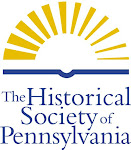Just as the Civil War was beginning, Samuel Chew and Mary Johnson Brown were planning their wedding. In the following letter to Eliza M. Mason (married to VA Senator James Murray Mason), Samuel Chew laments that the Masons will not be able to attend his marriage. "I expect to be married on the 20th of June. The mails between you and us, I fear, close tomorrow, and I cannot let the last opportunity of asking you to my wedding pass...though I cannot hope to see you on that occasion. Would to God that our unhappy Country could by that time be in such Peace and tranquility as to allow you...to be with me."
Later in the letter, his focus shifts to the national events that separated their family: "The whole country is full of military ardor. The genius of our People changed in four days from a plodding--moneymaking race to warriors.... Would...that we could hope for 'a more perfect Union.' ... It were good for neither section that one should be victorious and the other broken. The Power of the one must be as fatal to itself as would its misfortunes be to the vanquished....God forbid our Nation this Great Calamity." (Samuel Chew to Eliza M. Mason, May 30, 1861)



In a letter earlier in May of 1861, Henry B. Chew recounts the effects of regional conflicts in Maryland:
"I hardly need tell you of the utter impossibility every where existing in the collection of money Either in way of rent or of other debts owing--Such a financial crisis never before existed, and God only knows when it will terminate." This line rings eerily familiar in 2008, as the stock market dips lower and the Great Depression is invoked almost daily.
Given the financial situation, Henry advises his son that the planned wedding should be modest, and their expenditures minimal.
"My mind is relieved by what you say of the time of your wedding + that my suggestions are likely to be carried out, to avoid expenditure of every dollar that can be saved...at this time of such financial embarrassment. We shall with pleasure welcome dear Mary to Epsom and do the best we can under existing circumstances to render her visit a happy one, although I cannot now have the house so re-furbished as I intended....[I]t cannot be expected that we can have any large festive entertainment at Epsom." (May 16, 1861)


In another letter, closer to the wedding date, Henry B. Chew writes again to Samuel about the financial crisis and his thoughts about the upcoming wedding:
"I am confident that Mr. Brown has good sence enough to understand our true position + to appreciate the correctness of my strenuous advice as to our endeavoring to avoid the expenditure of every dollar that can in any decent manner be saved, on account of the universal distress in the pecuniary relations of all...and considering the uncertainty of the period when peace + prosperity will be restored to our land + nation....I also think Mr. Brown will concur with me in saying you + Mary should not have your happiness interfered with or diminished by any possible thought of postponement of your marriage...nor by your being advised to forego the display + expense of such a fashionable + festive marriage as might have been anticipated at any other time." (June 6, 1861)
As I read through these letters, especially in the context of our current financial situation in this country and throughout the world, I am reminded that people have weathered these fears and uncertainties before. While we may need to pare down to the basics, history shows that we can rebound from these difficulties if we remain flexible.

























